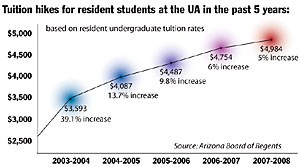PHOENIX – The Arizona Supreme Court agreed Tuesday to consider the legality of a case in which former UA students sued the Arizona Board of Regents for increasing tuition by nearly 40 percent in 2003.
In November, an appellate court decided the students are generally entitled to sue the board of regents over the decision to raise tuition. It did not say whether tuition was raised too much.
The regents challenged that outcome and appealed to the Supreme Court, which will decide whether the regents can be sued over tuition hikes.
Both plaintiffs and defendants applaud the step, saying they hope the court will rule in their favor.
“”Now it looks like it’s finally going to get decided,”” said John Kromko, a former UA student and state legislator, who was among those who initiated the suit. “”I think this is a vital state matter that really needs to be decided by the Supreme Court.””
Kromko and three other former students claim the regents violated the Arizona Constitution, which states that the “”university and all other state educational institutions shall be as nearly free as possible.””
When tuition was raised by 39.1 percent in the 2003-04 school year, the money was not used just to improve education directly, Kromko said, but also for scholarships, research and building construction.
In his experience tuition increases seldom have direct effects on higher standards in classroom equipment or better-qualified teachers, Kromko said.
“”It’s right to give scholarships but it’s not right for university students to pay for those,”” he said. “”The regents and the universities have not taken any steps to ensure that tuition is as low as possible.””
But the regents say they are the ones to decide what tuition money can be used for.
Part of that capacity is to ensure that enough financial aid is available to students who can’t afford higher tuition rates, said Nancy Tribbensee, the general council for the Arizona University System and a staff member of the Arizona Board of Regents.
“”We’re pleased that the Supreme Court has accepted review of Kromko,”” she said “”This gives them the opportunity to reaffirm the regents’ constitutional authority to set tuition rates.””
If the Supreme Court decides it is lawful to sue the regents, the initial case has to be reconsidered by the trial court.
The challenge then for both parties would be to prove what exactly “”as free as possible”” means and what would be an unreasonably high tuition hike that could be claimed unconstitutional.
If the Supreme Court decides the regents cannot be sued over that matter, the case will be dead.









